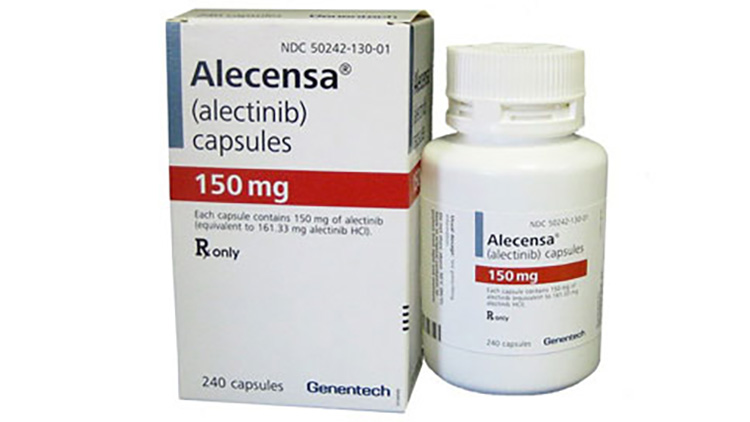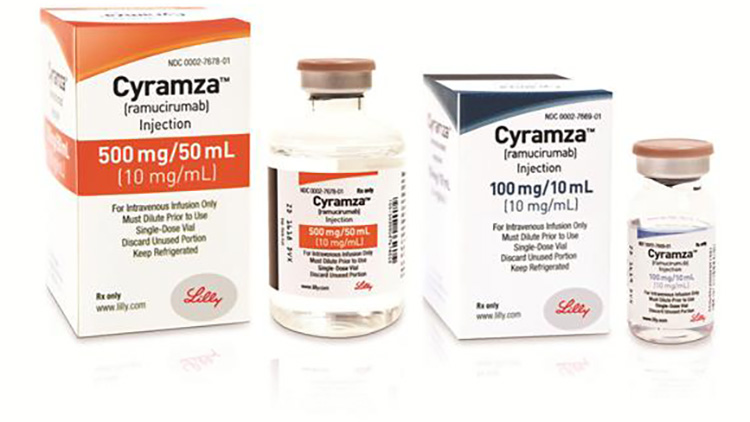Alecensa (alectinib) vs Cyramza (ramucirumab)
Alecensa (alectinib) vs Cyramza (ramucirumab)
Alecensa (alectinib) is an oral tyrosine kinase inhibitor specifically designed to target ALK-positive non-small cell lung cancer (NSCLC) and is typically prescribed for patients who have this specific genetic marker. Cyramza (ramucirumab), on the other hand, is a monoclonal antibody used intravenously and can be indicated for various types of cancer, including gastric cancer and non-small cell lung cancer without the ALK mutation, often in combination with other chemotherapy agents. The choice between Alecensa and Cyramza would depend on the patient's specific type of cancer, the presence or absence of the ALK mutation, and the overall treatment plan determined by the oncologist.
Difference between Alecensa and Cyramza
| Metric | Alecensa (alectinib) | Cyramza (ramucirumab) |
|---|---|---|
| Generic name | Alectinib | Ramucirumab |
| Indications | Non-small cell lung cancer (NSCLC) with ALK-positive mutation | Gastric cancer, non-small cell lung cancer (NSCLC), colorectal cancer, and hepatocellular carcinoma |
| Mechanism of action | ALK inhibitor | VEGFR2 antagonist |
| Brand names | Alecensa | Cyramza |
| Administrative route | Oral | Intravenous |
| Side effects | Fatigue, constipation, edema, myalgia, anemia | Hypertension, diarrhea, headache, bleeding/hemorrhage |
| Contraindications | Hypersensitivity to alectinib or any component of the formulation | Hypersensitivity to ramucirumab or any component of the formulation |
| Drug class | Tyrosine kinase inhibitor | Monoclonal antibody |
| Manufacturer | Genentech (Roche) | Eli Lilly and Company |
Efficacy
Alecensa (Alectinib) Efficacy in Treating Lung Cancer
Alecensa, the brand name for alectinib, is an oral medication approved by the U.S. Food and Drug Administration (FDA) for the treatment of non-small cell lung cancer (NSCLC) specifically in patients who have an abnormal anaplastic lymphoma kinase (ALK) gene. Alectinib is classified as an ALK inhibitor, which works by blocking the activity of the ALK protein, thereby preventing the growth of cancer cells. In clinical trials, alectinib has demonstrated significant efficacy in patients with ALK-positive NSCLC, showing improved progression-free survival compared to chemotherapy or crizotinib, another ALK inhibitor. Furthermore, alectinib has been found to be effective in treating patients with central nervous system (CNS) metastases, a common complication of lung cancer.
Studies have shown that alectinib is not only effective as a first-line treatment but also in cases where the disease has progressed after treatment with crizotinib. The ALEX trial, a phase III clinical study, compared alectinib to crizotinib in untreated ALK-positive NSCLC patients and found that alectinib significantly reduced the risk of disease progression or death by 53%. Additionally, the J-ALEX study conducted in Japan confirmed the superiority of alectinib over crizotinib in terms of efficacy and safety.
Cyramza (Ramucirumab) Efficacy in Treating Lung Cancer
Cyramza, known generically as ramucirumab, is a monoclonal antibody that targets the vascular endothelial growth factor receptor 2 (VEGFR2), which is involved in the formation of new blood vessels that supply tumors with nutrients and oxygen, a process known as angiogenesis. The FDA has approved ramucirumab for use in combination with docetaxel for the treatment of patients with metastatic NSCLC whose cancer has progressed during or after platinum-based chemotherapy. Clinical trials have demonstrated that the addition of ramucirumab to docetaxel improves overall survival in these patients compared to docetaxel alone.
The efficacy of ramucirumab was evaluated in the REVEL trial, a randomized, double-blind, placebo-controlled phase III study. The results showed that patients receiving ramucirumab plus docetaxel had a median overall survival of 10.5 months compared to 9.1 months for those receiving placebo plus docetaxel. Furthermore, the combination treatment also resulted in an increased progression-free survival. These findings support the use of ramucirumab in combination with docetaxel as a second-line treatment for patients with metastatic NSCLC who have experienced disease progression on or after platinum-based chemotherapy.
Regulatory Agency Approvals
Alecensa
-
European Medical Agency (EMA), European Union

-
Food and Drug Administration (FDA), USA

-
Health Canada

-
Pharmaceuticals and Medical Devices Agency (PMDA), Japan

-
Therapeutic Goods Administration (TGA), Australia

-
Medsafe (NZ)

Cyramza
-
European Medical Agency (EMA), European Union

-
Food and Drug Administration (FDA), USA

-
Health Canada

-
Therapeutic Goods Administration (TGA), Australia

-
Medsafe (NZ)

Access Alecensa or Cyramza today
If Alecensa or Cyramza are not approved or available in your country (e.g. due to supply issues), you can access them via Everyone.org.
How it works

Make an enquiry
Choose the medicine you want to buy, answer a couple of questions, and upload your prescription to speed things up. We’ll get back to you within 24 hours.


Make an enquiry
Choose the medicine you want to buy, answer a couple of questions, and upload your prescription to speed things up. We’ll get back to you within 24 hours.


Breeze through the paperwork
We'll guide you through the required documents for importing unapproved medicine, ensuring you have all the necessary information.


Get a personalized quote
We’ll prepare a quote for you, including medicine costs and any shipping, administrative, or import fees that may apply.


Receive your medicine
Accept the quote and we’ll handle the rest - sourcing and safely delivering your medicine.

Some text on this page has been automatically generated. Speak to your physician before you start a new treatment or medication.
Let's talk
If you have any questions, call us or send us a message through WhatsApp or email:
Contact us




